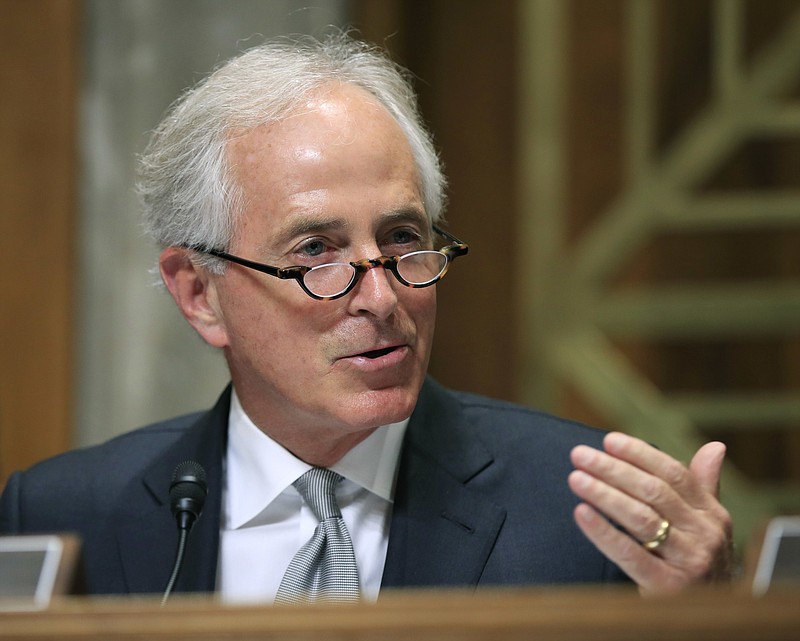Just before the holidays, Tennessee Sen. Bob Corker, who in September announced he will not seek a third term, had the opportunity to open the final act of his Senate career with distinction.
He already had stature and respect as a business-smart and plain-spoken moderate Republican lawmaker. He built on that stature - even with Democrats and progressives - when as the chaos of the Trump era unfolded, he offered thoughtful and common-sense critiques of the president's need for improvement.
He built on his reputation still more with his early December announcement that he would oppose the unpopular GOP tax cuts plan. Always a deficit hawk, Corker said he wouldn't vote for a plan that raised the deficit "one penny," so how could he vote for a plan that would raise it by an estimated $1 trillion?
Yet on Dec. 15, he changed his mind, and a few days later he joined fellow Republicans to vote 51-48 to pass a tweaked version of the tax bill - one then projected to add even more, at least $1.5 trillion, to the deficit.
Corker's opportunity for greatness turned into a firestorm of voter anger and a media storm of questions.
His flip-flop on the vote for tax cuts that are particularly beneficial to rich people - especially to rich people in commercial real estate like himself - became known as the "Corker kickbacks."
To be fair, the new tax law is a gift to the bipartisan rich. It also will benefit President Donald Trump and his family, 47 Republican House and Senate members who voted for the tax reform bill, as well as 33 Democratic Senator and House members who voted against it.
Because of Corker's stature, his no vote might have prompted other GOP no votes. When he voted yes, news reels and news columns swirled with questions about whether he changed his vote because of an added sweetener - an extra commercial real estate "pass-through" loophole that will benefit people in Corker's line of work.
An analysis for CNBC of Corker's personal financial disclosures done by the Center for Responsive Politics indicated he might save as much as $1.2 million. The Rolling Stone magazine even used the vote - and Corker as an object lesson - to center a story about how lawmakers may increase their net worth by millions while working full-time in Congress.
But in a meeting last week at the Chattanooga Times Free Press, Corker called the kickbacks label and particularly the Rolling Stone story "malarkey." He insisted that he wasn't told and didn't know about the last-minute, pass-through loopholes that benefit him, despite a pre-vote meeting with Senate Majority Leader Mitch McConnell.
He said that by the time he loses tens of thousands of dollars in property tax deductions for his two private homes (such deductions are now capped at $10,000), the benefit of the new commercial real estate "pass-through" loopholes may net him a mere $37,000 a year.
"The benefit to me is nominal," Corker said. (Though he does acknowledge that "nominal" could change if he actively re-engages with the commercial real estate business.)
Corker, whose net worth is north of $50 million, is indignant that he has been accused of self-interest in voting for the Republican tax act.
But his indignation is misplaced.
He doesn't seem to be able to wrap his head around the fact that his "nominal" $37,000 tax break is more than many Chattanoogans and Americans make in a year.
He doesn't seem to understand that people are angry not just because he'll get a tax cut the size of their income, but because it smells of everything swampy about Washington and about class warfare. He conveniently forgets that he was the senator who just weeks before had said he wouldn't vote on any tax bill that added a penny to the tax burden of our children and grandchildren, but in the end he voted for a historically unpopular tax bill that adds $1.5 trillion to their shoulders.
Why did he vote for it? Because the country will be "better off with it," he said. Because it would be "good for business."
Especially some businesses.
Tax Policy Center experts say these tax cuts will, by 2027, reward the richest 1 percent of U.S. households with 82.2 percent of tax cut benefits. Meanwhile, an average of nine polls taken in December found that only 33 percent of Americans favored the tax cuts bill and 52 percent opposed it. The -19 percentage point split makes this the least popular major tax bill since at least the Ronald Reagan tax cuts in 1986, according to FiveThirtyEight.com.
At a time when every Republican vote counted, Corker could have insisted that this gross disparity be removed.
Instead, he acquiesced. He should not be surprised that people think the worst.
With all due respect, Sen. Corker: We feel your pain, but do you feel ours? You could have been - still - a deficit-hawk hero for the little guy. Now you are not.
There is one upside. All of 2018 stretches ahead. We challenge our senator to use the year ahead to show us he's the stalwart statesman we believe he can be.
